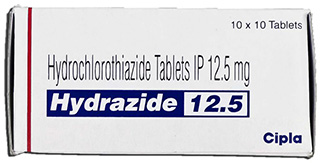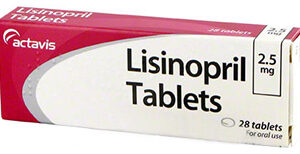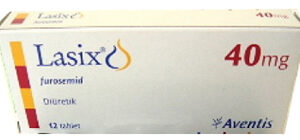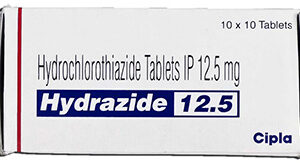Hydrochlorothiazide Overview
Hydrochlorothiazide, frequently abbreviated as HCTZ, serves as a cornerstone in the management of hypertension and edema. Recognized as an antihypertensive and diuretic, it is commonly prescribed for its efficacy, safety profile, and as part of combination therapy for high blood pressure control.
Classification
This medication belongs to a class known as thiazide diuretics or ‘water pills’. It influences the renal system to expel excess fluid and sodium, mitigating conditions such as fluid retention and high blood pressure.
Action Mechanism
Hydrochlorothiazide reduces the body’s fluid volume by targeting the kidneys, lessening the workload on the arterial walls. This reduction is achieved by increasing the excretion of sodium and chloride ions, which in turn fosters the excretion of water.
Indications
Physicians prescribe Hydrochlorothiazide for hypertension management, either as a stand-alone therapy or in conjunction with other antihypertensives. It is also indicated for edema associated with heart failure, hepatic cirrhosis, renal dysfunction, and corticosteroid medications.
Dosage and Administration
The appropriate dosage of Hydrochlorothiazide varies, depending on the indication and patient response. Initial doses often start at 12.5 mg to 25 mg daily for hypertension and may be adjusted. For edema, doses may be higher. It’s administered orally and can be taken with or without food, yet intake should be consistent in relation to meals to maintain steady drug levels in the bloodstream.
Contraindications
Contraindications include hypersensitivity to Hydrochlorothiazide or other sulfonamide-derived drugs. It should not be used in patients unable to urinate or who have anuria.
Drug Interactions
Hydrochlorothiazide can interact with multiple drugs, including digitalis, lithium, and certain anti-diabetic agents, potentially requiring dose adjustments. It can also intensify the effects of other antihypertensive medications, increasing the chance of hypotension.
Adverse Reactions
Common adverse reactions are dizziness, hypokalemia, hyponatremia, dehydration, and metabolic alkalosis. Less frequent yet more severe reactions may involve renal impairment, arrhythmias, and pancreatitis.
Precautions and Warnings
Prior to commencing treatment, patients should be informed about the risks of electrolyte imbalance and dehydration. Patients with a history of gout, diabetes, or hyperlipidemia should proceed with caution, as Hydrochlorothiazide could potentially aggravate these conditions.
Counseling Points
Patients are to be cautioned on the symptoms of electrolyte imbalance, such as dry mouth, thirst, weakness, lethargy, drowsiness, restlessness, painful or stiff muscles, nausea, or vomiting. Adherence to prescribed doses and scheduled follow-up appointments is essential.
Overdose Management
In cases of overdose, symptomatic and supportive treatment is essential. This may involve fluid and electrolyte replacement, and there’s no specific antidote available for Hydrochlorothiazide overdose.
Storage Guidelines
Hydrochlorothiazide should be stored at room temperature, kept away from moisture and light. It should also be kept out of reach of children and pets.
Clinical Pharmacology
The therapeutic effects of Hydrochlorothiazide are attributed to its ability to act on the electrolyte reabsorption in the distal renal tubules, leading to increased excretion of sodium and chloride.
Pharmacokinetics
After oral administration, Hydrochlorothiazide is absorbed and reaches peak plasma concentrations within 1-5 hours. It possesses a retention half-life of 5.6-14.8 hours, and its effect persists for approximately 6-12 hours after a single dose.
Clinical Evidence
Clinical trials have underscored the efficacy of Hydrochlorothiazide in lowering blood pressure and reducing the risk of cardiovascular events related to hypertension.
Specific Populations
Adjustments in dosing may be required for different patient populations, such as those with impaired renal or hepatic function. The medication is also used with caution in elderly patients, who may be more prone to side effects.
Reproductive Considerations
Drug safety for pregnant or lactating women is a key concern. Hydrochlorothiazide should only be used when the potential benefits outweigh the risks to the fetus or neonate.
Pediatric Administration
While the use in pediatric patients is less common, dosing in children is determined by weight. Clinical studies and prescriber guidance provide direction on suitable dosages for this group.
Elderly Patients
Older adults may be more sensitive to the side effects of Hydrochlorothiazide. Consequently, it is typically initiated at the lower end of the dosing range.
Liver and Kidney Impairment
Patients with hepatic or renal impairment should be carefully monitored while on Hydrochlorothiazide therapy, as they may require lower doses or alternative treatments.
Monitoring
Regular monitoring of electrolytes, kidney function, and blood pressure is necessary for patients consuming Hydrochlorothiazide to preempt potential adverse effects.
Safety Essentials
Maintaining hydration, monitoring for signs of electrolyte imbalance, and adhering to dosage recommendations are vital safety considerations with Hydrochlorothiazide use.
Medication Accuracy
Ensuring the correct drug, dose, route, and timing is crucial to prevent medication errors. Any uncertainty surrounding Hydrochlorothiazide should prompt checks against medical orders and clarification from a healthcare provider.
Educating Patients
Discussion on proper drug administration, lifestyle modifications, and symptom recognition should form part of the education provided to patients starting Hydrochlorothiazide.
Common Queries
Patients frequently inquire about the timing of doses, dietary restrictions, and interaction with over-the-counter drugs or natural health products. Healthcare professionals should be equipped to provide comprehensive responses to promote informed and safe use of Hydrochlorothiazide.






Reviews
There are no reviews yet.